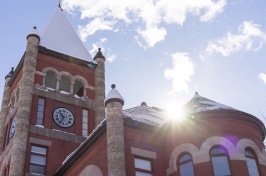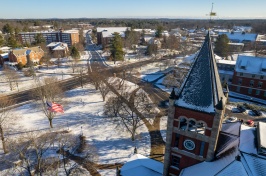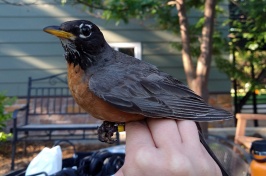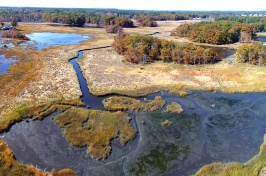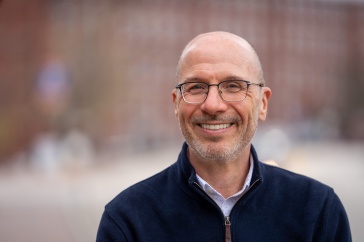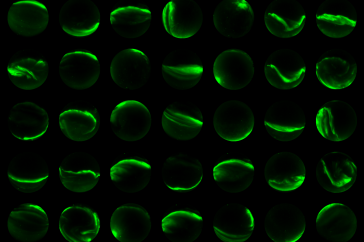Former UNH President Eugene Mills, 95, died on Aug. 17, a few months after Dottie, his wife of 74 years, passed away.
Mills served as UNH’s 13th president from 1974 to 1979, but his career at UNH had begun more than a dozen years before as chair of the psychology department, dean of the graduate school, dean of the College of Liberal Arts, academic vice president and provost.
"As chair of the presidential search committee, it was a proud moment for me to announce the selection of Dr. Gene Mills,” recalls Ginny Theo-Steelman, ‘62, ‘69G. “The final impetus for his selection was not only his academic achievements. It was Gene’s deep love and commitment to UNH, unmatched by several highly competitive candidates.
“Gene’s devotion to the university was lifelong. I‘ve always felt fortunate he and I had a strong connection throughout his tenure and further engagement with UNH after he retired."
First as provost and then as president, Mills had his work cut out for him. As provost under 12th president Tom Bonner, he took on much of the day-to-day work of the president’s office, while Bonner prioritized strengthening the university system at the request of its board of trustees. Later, when Mills succeeded Bonner as president, his tenure continued to reflect the aftershocks of the tumultuous 1960s. Between the Vietnam War protests, civil rights unrest and now widely recognized gender inequity nationwide (in 1973, only three of UNH’s 138 full professors were women) and the growing voice of the LGBTQ+ community (then newly organized as the Gay Students Organization), the challenges seemed insurmountable.
Add to that near constant attacks from the state’s conservative newspaper, the Manchester Union Leader, and its publisher, William Loeb, as well as from Gov. Meldrim Thomson and the state legislature. And then add a national energy crisis that was so severe the campus was shut for an extended time over winter break and UNH had to dip into reserves to pay the heating bill. While there were few new buildings constructed during his tenure (the Elliott Alumni Center and the themed mini dorms were the most notable), there is plenty of evidence that President Mills rebuilt what was most important for the times: relationships and systems between and among constituencies.
“He was a comforting president, a president who healed, and that was something we needed very much,” recalls J. Bonnie Newman, former UNH interim president, who served as dean of students during Mills’ presidency.
Some say it was Mills’ personal background that was the most important reason he was selected to become president. He was brought up in a strong Quaker family and earned his baccalaureate in psychology from Earlham College, a Quaker school. Throughout his life and his career, Mills demonstrated the Quaker tenets in his work to reach out to and respect other people, to listen and understand both sides of an issue. In his decision-making, Mills wanted consensus and he had the patience to wait for it.
After an era of protests and unrest, Mills brought people together. He and Dottie often hosted student and faculty gatherings at the president’s house. Newman thinks it is because of the many friendships the Mills made at UNH that Durham became their chosen place to retire. They both continued to be constant presences on the Durham campus.
More than once, Mills’ work to bring people together required taking existing structures apart. With 1972’s federal Title IX law front and center, Mills commissioned a task force to examine athletics, and under his direction, the program was divided into men’s and women’s athletics, with both athletic directors reporting directly to him. When faculty complained that student voices in the University Senate should not have the same weight as those who were teaching them, Mills separated the one body into two: what we now know as the Faculty Senate and the Student Senate. It is also because of Mills that the PAT and operating staff councils were created. He wanted all internal constituencies to advise him on the best path forward for UNH.
Newman says Mills was “the quintessential academician. Faculty respected him and students liked him very much” after what many remember to be the turbulent short tenure of predecessor Bonner. “Yes,” she says, “no doubt his Quaker background contributed to how Gene worked with people, but also he and Dottie were just incredibly decent people, and they cared deeply about UNH — especially the faculty who taught there, the staff who worked there and the students who studied there.”
Following his long tenure at UNH, Mills served as president of Whittier College for a decade and then as interim president of his alma mater, Earlham College.
Mills also was active in professional and scholarly organizations and helped establish at UNH the nationally recognized Elderhostel organization (now known as Road Scholar), serving as a director for 20 years and six years as its chairperson.
Before Mills was selected as president, Tom Bonner told him at a board of trustees’ meeting, “The president is expected to move about the cocktail circuit or the student union with equal elan; he is to be erudite, yet folksy; a visionary, yet a pragmatic politician; a bit of a stand-up comedian, yet in many ways also a country preacher — and through it all this oft-weary soul, this walking bundle of hopeless contradictions, is to smile and keep smiling.”
That weighty description did not deter Mills; instead, he grabbed the reins and led UNH through one of its most critical decades.
-
Written By:
Kim Billings | Communications and Public Affairs | kim.billings@unh.edu | 603-862-1558











